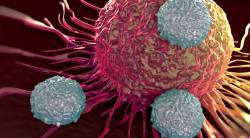- About Us
- Advertise / Support
- Editorial Board
- Contact Us
- CancerNetwork.com
- TargetedOnc.com
- OncLive.com
- OncNursingNews.com
- Terms & Conditions
- Privacy
- Do Not Sell My Information
- Washington My Health My Data
© 2025 MJH Life Sciences™ and CURE - Oncology & Cancer News for Patients & Caregivers. All rights reserved.
Patients With MPN-Related Fatigue ‘Know Their Bodies Very Well’
Ashley Chan, assistant editor for CURE®, has been with MJH Life Sciences since June 2023. She graduated with a B.A. in Communication Studies from Rowan University. Outside of work, Ashley enjoys spending time with family and friends, reading new novels by Asian American authors, and working on the manuscript of her New Adult novel.
It’s key for patients with MPN-related fatigue to communicate changes they feel, especially as they “know their bodies very well,” a nurse told CURE®.
Patients with myeloproliferative neoplasms (MPNs) may experience a number of symptoms, with fatigue being one of them.
MPNs are types of blood cancer and occur when there is an abnormal change in stem cells within the bone marrow, according to Leukemia and Lymphoma Society. This abnormal change can lead to increased amounts of white blood cells, red blood cells and platelets. The main three types of MPNs are essential thrombocythemia, myelofibrosis and polycythemia vera.
MPN-related fatigue can take a toll on a patient’s quality of life, notably because of the change in the blood’s consistency.
“Fatigue has a profound effect on patients’ quality of life. A lot of people don’t realize that if you have chronic fatigue, especially from MPNs, because your condition is unchecked, then a lot of times it can actually be debilitating,” Patrick Buxton, a clinical nurse coordinator in the hematology department at Fred Hutchinson Cancer Center in Seattle, Washington, said during an interview with CURE®.
“(Patients are) not having the energy to go out and work, participate in family events and just (engage with) life in general. And they just don't really feel well overall,” Buxton said. “And so, it’s important to monitor these patients’ labs to make sure that they stay within the range for their condition to ensure that they don’t end up developing those symptoms again, because when (a patient’s) blood counts become so high that (their) blood basically becomes a sludge, (they) definitely feel it. And it can cause a whole lot of problems centered around fatigue, but not just fatigue. It can cause a lot of inflammation issues.”
To work through the weight of fatigue, Buxton urged patients to hydrate, eat nutritious food and exercise.
“Especially with MPN, patients maintaining good hydration and adequate nutrition is very important. Because once (patients) kind of get stuck in a downward spiral, it can be very hard to get out,” he noted. “So, making sure that … patients are trying to get a good amount of exercise daily, even if it’s just getting out of bed, pushing (themselves) a little bit each day to try to get that energy going again and making sure that (they) eat and drink enough to keep going.”
Staying hydrated is essential for patients with MPNs, Buxton emphasized.
“Hydration cannot be stressed enough. A lot of people don’t hydrate with water, as I have come to realize, and so there’s been a lot of education patients have like, ‘Oh, I drink all the soda.’
And I'm like, ‘That’s not really helping. You need to drink water, especially when you have this condition, you need to keep on top of things.’”
For patients with MPNs who experience fatigue, Buxton advised them to have open communication with their care teams.
“That line of communication is very important. And even if the patients don’t think it’s important, they know their bodies very well. So, if something is not working right, communicate that to the team,” he said. “And know that it really is a lot of teamwork with the nurses, the patients, the doctors, that the patient is an integral part of the team; without the patient, we wouldn’t be here.
“So, know that (patients are) the center of all of this, and we are here to help, but if (they) don’t report these issues (to us) and just let them be then we won’t know. So, with that information, be a good self-advocate, because that’s how (they’re) going to get better care is being an active participant. Don’t let small things go because sometimes small stuff adds up to something big. And especially with fatigue — patients know their bodies well. So, follow up. Make sure that you are getting the care that you need.”
For more news on cancer updates, research and education, don’t forget to subscribe to CURE®’s newsletters here.
Related Content:




